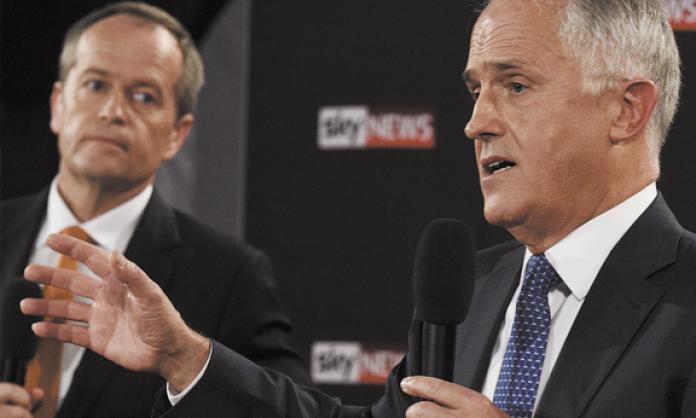World politics continues to be framed by the backwash from the 2007-08 global financial crisis, which discredited the neoliberal agenda that has dominated the whole political and economic framework of the advanced capitalist countries over the last 30 years.
The neoliberal centre – mainstream social democratic and labour parties, the moderate conservative parties and the social liberals like the US Democrats – has come under severe pressure. These were the parties that presided over rampant privatisation, the undermining of the welfare state and a vast transfer of wealth from the working class and the poor into the hands of the banks, the giant global corporations and the super rich.
In a number of countries, such as France, Italy, Greece, Austria and the Netherlands, support for the traditional social democratic parties has collapsed, while at the recent German elections there was a marked fall in the vote for both the Social Democratic Party and the Christian Democrats. The main beneficiaries of this disillusionment with mainstream politics has been the far right – Marine Le Pen’s National Front in France, the Freedom Party in Austria, Geert Wilders in the Netherlands, the open Nazis of the Alternative for Germany and above all Donald Trump in the US.
In a few countries, the rupture has also led to the rise of a new left, for example the radicalisation of the British Labour Party under Jeremy Corbyn, the impressive vote for Bernie Sanders in the US Democratic primaries, the emergence of Podemos in Spain and the rise of the Left Bloc in Portugal.
The overall framework is one of increased volatility and polarisation, which is compounded by the almost daily racist and warmongering provocations of Donald Trump in the White House.
Though Australia was not initially as severely impacted by the global financial crisis as most of Western Europe and North America – which suffered sharp rises in unemployment, brutal austerity measures and a slashing of wages – it has not escaped these pressures. Economic growth over the last five years has been far from impressive and propped up only by Australia’s very high levels of immigration.
Indeed, if you look at economic growth per head of population, the Australian economy has been performing worse than the sluggish growth of most of the rest of the advanced capitalist world. And as in most other countries, virtually all the benefits of the limited recovery that has occurred have gone to the big end of town and a small coterie of billionaires whose wealth has increased enormously.
There has been an unrelenting assault on workers and their unions, with cuts to penalty rates, a pathetic increase in the minimum wage, widespread wage theft, tight controls on pay rises in the public sector and savage fines handed out to unions that do stand up for their members. As a consequence, wages have been stagnant or falling for the last two years, and working conditions have continued to deteriorate.
Neoliberalism was on the nose even before the global financial crisis, but hostility is now deeply entrenched to the banks, to privatisation, to cuts to health and education spending and the outrageous salary packages of company CEOs. Politicians of all stripes are widely seen as being totally out of touch with popular opinion and subservient to corporate interests.
The problem is that this discontent has resulted in cynicism and a withdrawal from politics rather than a sustained fight back. There has been no recovery in the number of strikes from their depressingly low level.
Union membership continues its downward slide. Despite new ACTU secretary Sally McManus’ welcome call to defy unjust anti-worker laws, union officialdom shows absolutely no sign of being prepared to galvanise its membership for a concerted push back against the bosses’ attacks.
The ACTU’s primary focus is on getting Labor elected in the hope that Bill Shorten – the man who helped design the current Fair Work laws that the bosses are exploiting to undermine wages and conditions – will deliver a few token reforms. Indeed, the ACTU and the Trades Halls in each state these days seem more like an electoral arm of the ALP, concentrating on doorknocking and phone banking to get the vote out rather than on what should be their core task of rebuilding union organisation and member confidence to fight on the job.
The ALP has to some extent sensed the shifting mood internationally and has edged slightly to the left, but there is little prospect of a Corbyn moment here any time soon. Shorten and Co. clearly see themselves as a government in waiting as the Turnbull government lurches from one crisis to another and eventual electoral defeat.
But it is not just the union movement that has been in a long retreat. The campuses remain passive, with no sign of a revival of the student movement.
There has been no left wing mass movement on the streets since the enormous protests in the early 2000s against the invasion of Iraq, and the union marches against WorkChoices a few years later. The standout exception to this pattern has been the campaign for marriage equality, which mobilised vibrant street protests and a wide network of activists and helped galvanise a massive turnout in the postal plebiscite.
The overwhelming Yes vote was a decisive repudiation of the socially conservative right and a clear confirmation that, when an issue cuts through and a clear lead is given, the mass of people can be inspired to back a progressive cause. It further inflamed the bitter divisions in the Liberal Party.
The wretched Turnbull government has achieved next to nothing in office. Despite Turnbull’s faux liberal image, his government has done little to revamp the Australian economy or reposition the Liberal Party with a modern image.
It has stuck rigidly to the hard right’s agenda of fearmongering about terrorism, Islamophobia, attacks on refugees and welfare recipients, union bashing, attacks on democratic rights and law and order hysteria. Turnbull has positioned himself as the most uncritical backer of Donald Trump of any leader in the Western world other than Israel’s Benjamin Netanyahu.
The top echelons of the corporate establishment have been far from impressed by the impasse in Canberra and the factional warfare within the Liberal Party. As dramatically revealed in the hostile popular reaction to the 2014 Abbott-Hockey austerity budget, the government has not had the political authority and social weight to push through substantial cuts to health, education and welfare spending or deliver major tax cuts for big business.
So the bosses have stepped up the class war in the workplaces to hold down wages, intensify the pace of work, undermine traditional work practices, force through redundancies and undermine the unions. Lockouts and the abandonment of enterprise agreements for the much lower award wages have become common bosses’ tactics.
On this score, the bosses have been remarkably successful. This is reflected in recent figures that reveal the wages share of national income in Australia is the lowest in the Western world – lower even than in Britain and Trump’s United States. No wonder there is discontent.
The trouble is that the reaction to stagnant wages, rising electricity prices, bank rip-offs, young people being forced out of the housing market, the running down of public transport, the hospitals and the education system primarily is taking the form of cynicism, a loathing of politicians and the media and political disengagement.
In Europe and North America, this profound cynicism and hostility to the political class have provided a fertile breeding ground for the far right. Hanson has tried to feed off this sentiment, but outside Queensland her old-fashioned 1950s style reactionary politics have failed to resonate seriously, and she has singularly failed to build a reliable apparatus.
The opinion polls are ominous for Turnbull, and there is speculation in both the Murdoch and Fairfax press of him being replaced by the likes of the appalling Julie Bishop. Either way, it is difficult to see the Liberals surviving the next election, and sections of the ruling class are preparing themselves for a Labor victory.
Depending on the exact state of the economy, a Shorten government might deliver some quite limited reforms for workers and slightly ease the harsh restrictions on the unions’ rights to organise. However, it will be in no sense a radical government or one that breaks decisively with neoliberalism.
It will be a government that, like all the Labor governments over the last 30 years, fundamentally seeks to manage capitalism in the interests of the big end of town. It will be a government that we have to fight all the way. This presents the crying need to build a militant socialist alternative to organise that vital fight back in the workplaces, on the campuses and in the streets.









